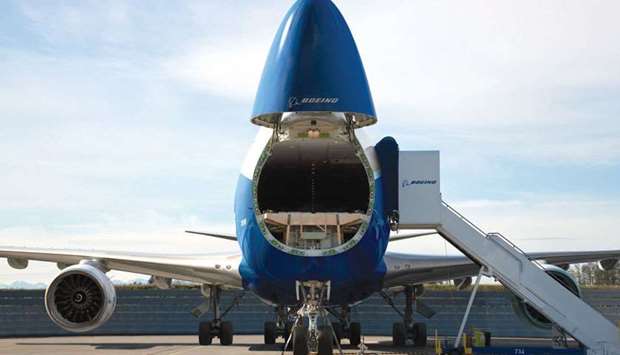According to the International Air Transport Association (IATA), cargo business generates 9% of airline revenues, representing more than twice the revenues from the first class segment.
The value of goods carried by air is expected to exceed $6.2tn in 2018. Airlines transport over 62mn metric tonnes of goods a year, representing more than 35% of global trade.
Qatar too lays significant emphasis on developing its air freight industry, particularly after the illegal blockade on the country by a quartet of Arab countries.
Qatar Airways Cargo is the world’s second-largest cargo carrier flying a young and modern fleet of 23 freighters to more than 60 dedicated cargo destinations.
Additionally, it provides belly-hold services on Qatar Airways’ fleet of more than 180 passenger aircraft to a global network of more than 150 destinations. The cargo fleet now includes two Boeing 747-8, 13 Boeing 777 and eight Airbus A330 freighters.
With no road access and reduced air freight, Qatar Airways Cargo has been playing a crucial role in maintaining critical medical, food and manufacturing supplies to the country.
Clearly, it was a lifeline through Qatar Airways Cargo. Qatar Airways Group undertook a massive airlift of food and grocery items when the illegal blockade was first initiated.
This undertaking, arranged entirely by Qatar Airways Cargo, lasted several weeks and used its own fleet, as well as other leased aircraft.
In this context, Gulf Times Aviation spoke to Boeing spokesperson Randy Tinseth on the significance of the air cargo industry, Boeing’s focus on the business, and its relationship with Qatar Airways.

Tinseth: Strong partnership
Tinseth said Boeing and Qatar Airways Cargo have enjoyed a strong partnership for more than a decade and looked forward to future together.
“We are proud that our Boeing freighters have helped Qatar Airways become one of the leading cargo carriers in the world. Just this month, we had the honour of welcoming Qatar Airways Group chief executive, His Excellency Mr Akbar al-Baker for a tour of our factory near Seattle. During the visit, the airline took delivery of two more 777 Freighters. With those new airplanes, Qatar Airways now operates 15 777Fs and two 747-8Fs.”
Qatar’s Boeing freighter fleet will continue to grow in the coming years, Tinseth noted.
At the Farnborough Airshow this year, Qatar confirmed an order for five more 777Fs, which means they have a total of six more 777Fs on the way.
In addition to Boeing freighters, Qatar Airways operates many Boeing passenger jets, including 777-300ERs, 777-200LRs and 787-8 Dreamliners.
Qatar Airways was the first Middle East carrier to fly the 787 Dreamliner and will be a launch customer for the new 777X.

A Boeing 777 freighter being delivered to Qatar Airways at its production facility near Seattle in the US
Tinseth said Boeing is proud to play a role in supporting QR Cargo’s vision of expanding their fleet to become one of the world’s top cargo operators.
The delivery of the two 777 Freighters earlier this month is another sign of the airline’s continued investment in its Boeing fleet and its commitment to securing its position as the world’s leading cargo carrier.
Boeing is uniquely positioned to support QR Cargo’s vision because we have the most capable freighter family in the industry. From the long-range 777 Freighter, to the new 737-800BCF, the Boeing Freighter family delivers unparalleled options to match capacity and capability needs, all with superior economics.
In particular, the 777F brings unsurpassed efficiency to long-range markets. With a range of 9,070km and a payload of 102 tonnes, the 777F can fly farther and offer more capacity than any other twin-engine freighter.
This translates into significant savings for cargo operators because of fewer stops and associated landing fees, less congestion at transfer hubs, lower cargo handling costs and faster delivery times.
The 777F will play a key role in helping QR cargo and other leading operators carry the world’s growing cargo traffic.
According to the ‘2018 Boeing Commercial Market Outlook’, there will be 2,650 freighter deliveries in the next 20 years. Of these, 1,670 will be passenger to freighter conversions. The remaining 980 airplanes, valued at $280bn, will be new production freighters.
The Boeing spokesman said the Chicago-based plane maker has consistently invested in its freighter family to help express cargo and industrial freight operators carry out their missions around the world.
“Whether we’re talking about the 767F, the 747-8F, the 777F or our converted freighter programmes, Boeing offers an unmatched combination of payload, range and fuel efficiency,” Tinseth said. “I think the world’s cargo operators have validated our family with their fleet choices. Globally, Boeing provides over 90% freighter airplane capacity. This year, we have sold more than 100 new production freighters and converted freighters, far surpassing our competition. And from 2014 through the first half of this year, Boeing holds a roughly 98% share of freighter orders and 92% of deliveries.
“We will continue to watch this market very closely to see how we can support customers like Qatar Airways. For example, earlier this year we announced that we plan to increase 767 production from 2.5 to 3/month beginning in 2020 to provide more freighters for our customers sooner,” Tinseth added.


